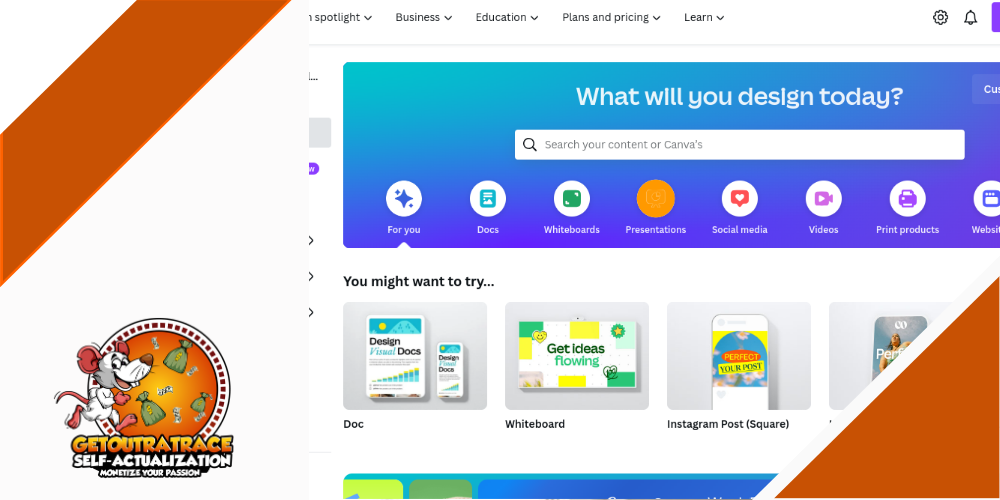SELF ACTUALIZATION
Create a website platform from your passion.
Like a driver’s license, it unlocks numerous opportunities for monetization.
Phone number
07729 866 544

This online hub section covers various topics related to this website that are discussed in short sections. Entrepreneurship, Business, Estate Planning, Credit Score, Charities, Outsourcing, Monetization and much more. Everything is related to important personal solutions, financial planning business, and making money online. Some topics we offer services or products for, and other topics we just promote or discuss to create awareness of their importance and expert independent advice that should be taken. This online hub will grow over time. Free and paid workshops will come in the future.
Entrepreneurship is like diving into a vast ocean with endless possibilities. It’s about creating something from nothing, turning ideas into reality, and taking risks in pursuit of a vision.
At its core, entrepreneurship is about problem-solving. Entrepreneurs identify needs or inefficiencies in the market and develop innovative solutions to address them. This could mean creating a new product, service, or business model that disrupts existing industries or fulfills unmet demands.
One of the most fascinating aspects of entrepreneurship is its diversity. It encompasses various forms, from tech startups to small local businesses, from social enterprises to large corporations. It’s not just about making money; it’s also about creating value, impacting communities, and driving positive change.
But it’s not all sunshine and rainbows. Entrepreneurship is also fraught with challenges and uncertainties. From funding issues to fierce competition, from regulatory hurdles to the constant pressure to innovate, entrepreneurs face a myriad of obstacles on their journey.
Yet, despite the challenges, entrepreneurship remains an exhilarating path for those with a passion for innovation and a willingness to embrace risk. It’s about resilience, adaptability, and the relentless pursuit of one’s dreams. And for many entrepreneurs, the journey itself is as rewarding as the destination.

You see so many people setting up some type of unit in their gardens and backyards or in other locations. When you drive around you will have probably seen them in shopping parks and events. Some mobile some fixed. There is a variety of wooden, metal, or plastic choices with different price ranges.
Another great option is this particular one you can buy from containers direct in Knowlsley. They have different ones, this particular one is a kiosk. It comes flat pack and can be set up in a few hours. Another great idea is to approach a landlord on some unused space they might not be utilizing in the basement or backyard. Get creative and you will be surprised what a bit of paint, fake grass, and some labor can achieve. The end result will be unused space being turned into usable space that you can rent out and generate a profit for you and the landlord.
Perfect for a nail bar, dog grooming, micro-chipping business, and much more.
Video and Pictures coming soon
If you would like to purchase contact Neil or Cory at
Containers Direct

Estate planning is the process of arranging and managing your assets during your lifetime and beyond to ensure they are distributed according to your wishes after you pass away. It involves making decisions about how your assets will be transferred, who will inherit them, and who will be responsible for managing them. If people do not make such arrangements the state will take a lot of it read the article.
Here are some key components of estate planning:
Will: A will is a legal document that specifies how your assets will be distributed after your death. It allows you to designate beneficiaries for your property and assets and name an executor to carry out your wishes.
Trusts: Trusts are legal arrangements that hold assets on behalf of a beneficiary or beneficiaries. They can be used to manage and distribute assets according to specific instructions, provide for minor children or individuals with special needs, and minimize estate taxes.
Power of Attorney: A power of attorney allows you to appoint someone to make financial or medical decisions on your behalf if you become unable to do so yourself due to illness or incapacity.
Healthcare Directive: Also known as a living will or advance directive, this document outlines your preferences for medical treatment and end-of-life care in case you are unable to communicate your wishes.
Beneficiary Designations: Certain assets, such as life insurance policies, retirement accounts, and bank accounts, allow you to designate beneficiaries who will receive the assets upon your death. It’s important to regularly review and update these designations to ensure they align with your estate plan.
Guardianship: If you have minor children, it’s crucial to designate guardians who will take care of them in the event of your death.
Estate planning is not just for the wealthy; it’s essential for everyone regardless of the size of their estate. Proper estate planning can help minimise estate taxes, avoid probate, protect assets from creditors, and ensure that your loved ones are taken care of according to your wishes. It’s advisable to work with a qualified estate planning attorney or financial advisor to create a plan tailored to your specific needs and circumstances. Keep up to date with the changes taking place in the Law society.

Charities are vital because they address a wide range of social, environmental, and humanitarian issues that might otherwise be neglected. They act as a bridge, connecting the generosity of individuals and communities to those in need. Through financial support, awareness, and volunteerism, charities tackle problems like poverty, disease, inequality, environmental degradation, and more, often stepping in where governments and institutions may fall short.
There are countless causes and charities because the world faces a multitude of challenges, and each person resonates differently based on their values, experiences, and passions. Some may feel drawn to support medical research, while others are compelled to help alleviate homelessness, protect the environment, or fight for social justice. This diversity in causes allows for a more comprehensive approach to solving the world’s problems, as different organizations address issues from multiple angles.
It’s important to do our part in supporting causes that speak to us, no matter how small our contributions might seem. When more people come together to support the causes they care about, the collective impact grows, creating a ripple effect of positive change. Each effort, whether a donation, raising awareness, or volunteering time, contributes to making the world a better place for everyone. The more we give, the stronger our communities become, and the closer we get to solving the problems that affect us all. Making a Difference.

Having a lot of money in the bank is meaningless if you have a poor credit score or no activity on your file.
Your credit score is a numerical representation of your creditworthiness, which is used by lenders to assess the risk of lending you money or extending credit. It’s essentially a measure of how likely you are to repay your debts on time.
Here are some key points about credit scores:
Range: Credit scores typically range from 300 to 850, with higher scores indicating better creditworthiness. Different credit bureaus may use slightly different scoring models, but the general range remains the same.
Factors Affecting Credit Score:
Credit agencies: There are three major credit bureaus in the United States: Equifax, Experian, and TransUnion. Each of these bureaus collects information about your credit history and calculates your credit score based on their scoring models.
Checking Your Score: You can check your credit score for free through various online services or by obtaining a free credit report annually from each of the three credit bureaus through AnnualCreditReport.com.
Importance: Your credit score is crucial because it affects your ability to borrow money, the interest rates you’ll pay on loans and credit cards, and even your ability to rent an apartment or get certain jobs. A higher credit score generally means better terms and lower costs for borrowing.
Improving Your Score: If you have a low credit score, you can take steps to improve it over time. This includes making all your payments on time, keeping credit card balances low, avoiding opening new accounts unnecessarily, and regularly checking your credit report for errors.
Maintaining a good credit score is essential for achieving financial goals and accessing credit when needed, so it’s worth understanding how it works and how to manage it responsibly. Check out Martins Money’s Credit Club It’s a free alternative to others that might charge.

This is not advice seek qualified expert advice services concerning any property investments or any other for that matter. The objective here is just to promote other experts who are involved in property in different ways. As in anything all caution, investigation, and own research should be applied.
Property out of all other investments can be one of the safest. Property investment involves purchasing real estate with the goal of generating income or capital appreciation. It’s a popular form of investment for many reasons, including the potential for steady income, diversification of investment portfolios, and long-term wealth accumulation.
Here are some key points about property investment:
Types of Properties: Property investment can involve various types of real estate, such as residential properties (houses, apartments, condominiums), commercial properties (office buildings, retail spaces), industrial properties (warehouses, factories), and even vacant land.
Rental Income: One of the primary ways to make money from property investment is through rental income. Landlords rent out their properties to tenants, who pay rent in exchange for using the space. Rental income can provide a steady cash flow, especially if the property is in a high-demand area.
Appreciation: Properties can appreciate in value over time, which can result in capital gains when the property is sold. Factors such as location, economic conditions, development projects, and improvements to the property can contribute to its appreciation.
Leverage: Property investment often allows for leverage, meaning investors can use borrowed funds (such as a mortgage) to purchase a property. This leverage can amplify returns, as the investor’s own money is supplemented by borrowed funds. However, leverage also increases risk, as it magnifies losses if the property’s value declines.
Tax Benefits: Property investors may benefit from various tax deductions and incentives. These can include deductions for mortgage interest, property taxes, depreciation, and expenses related to property maintenance and management.
Diversification: Property investment can serve as a diversification strategy within an investment portfolio. Real estate tends to have a low correlation with other asset classes, such as stocks and bonds, so adding real estate to a portfolio can help reduce overall investment risk.
Challenges and Risks: Property investment comes with its own set of challenges and risks. These can include vacancies, property damage, unexpected maintenance costs, changes in market conditions, and difficulty in finding suitable tenants. It’s important for investors to conduct thorough due diligence and be prepared to handle these challenges.
Long-Term Investment: Property investment is often seen as a long-term strategy. While it’s possible to make quick profits through property flipping (buying and selling properties quickly for a profit), many investors focus on building wealth over time through rental income and property appreciation.
Overall, property investment can be a lucrative way to build wealth and achieve financial goals, but it requires careful planning, research, and ongoing management. I have no affiliation with the following recommendations at all. There are plenty of people online who talk about property investments, or some people might know someone who is involved in property. On the other side, some people who are new to property or even experienced can always learn something new. Find out more on property.

AI offers numerous benefits to small businesses, helping them improve efficiency, enhance customer experiences, and compete with larger enterprises. Here are several ways small businesses can leverage AI:
Customer Service and Support: Implementing AI-powered chatbots on websites or social media platforms allows small businesses to provide 24/7 customer support. Chatbots can answer common questions, assist with product inquiries, and even process orders, freeing up human agents for more complex tasks.
Marketing and Sales: AI helps small businesses target their marketing efforts more effectively. AI-driven analytics platforms analyze customer data to identify patterns and preferences, enabling businesses to create personalized marketing campaigns. AI can also optimize advertising spending by targeting specific demographics and channels with higher conversion rates.
Predictive Analytics: Small businesses can use AI to predict customer behavior and market trends. Predictive analytics tools analyze historical data to forecast sales, identify potential opportunities, and optimize inventory management. This enables small businesses to make data-driven decisions and anticipate changes in demand.
Process Automation: AI automates repetitive tasks, allowing small businesses to streamline operations and improve efficiency. Tasks such as data entry, invoicing, and inventory management can be automated using AI-powered tools, saving time and reducing human errors.
Virtual Assistants: Virtual assistants powered by AI can help small business owners manage their schedules, organize tasks, and prioritize work. These assistants can schedule meetings, set reminders, and provide updates on important deadlines, enabling business owners to focus on strategic activities.
Fraud Detection and Security: AI helps small businesses detect and prevent fraud by analyzing patterns and anomalies in transaction data. AI-driven fraud detection systems can identify suspicious activities, such as unauthorized transactions or unusual spending patterns, and alert business owners in real time.
Website Optimization: AI tools can optimize small business websites for better user experience and higher conversion rates. AI-driven website builders and optimization platforms analyze user behavior to make real-time adjustments, such as personalized content recommendations, A/B testing, and dynamic pricing.
Inventory Management: AI optimizes inventory management for small businesses by forecasting demand and optimizing stock levels. AI-powered inventory management systems analyze sales data, seasonality, and external factors to predict demand accurately, reducing stockouts and overstocking.
Financial Management: AI helps small businesses manage their finances more efficiently. AI-driven accounting software automates bookkeeping tasks, categorizes expenses, and generates financial reports. These tools provide small business owners with real-time insights into their financial health and help them make informed decisions.
Competitive Analysis: AI-driven market intelligence tools help small businesses monitor competitors and identify opportunities for growth. These tools analyze competitor strategies, pricing trends, and customer feedback, enabling small businesses to stay competitive in their industry.
By leveraging AI technologies, small businesses can improve productivity, reduce costs, and provide better experiences for their customers, ultimately driving growth and success. There are so many AI technologies available that can be used for your niche. The most popular one everyone should become familiar with is ChatGPT.

Fiverr is an online marketplace that connects freelancers with clients who need various digital services. Here’s an overview:
Services Offered: Fiverr offers a wide range of services, including graphic design, digital marketing, writing and translation, programming and tech, video and animation, music and audio, business services, and lifestyle services.
Gigs: Freelancers on Fiverr create “gigs,” which are listings for the services they offer. Each gig outlines the service, its scope, pricing, and delivery time. Buyers can browse through these gigs and select the ones that meet their needs.
Freelancers: Fiverr freelancers come from all over the world and offer diverse skills and expertise. They include graphic designers, copywriters, social media managers, programmers, voice actors, translators, and many more. Freelancers set their own prices and terms for their services.
Search and Filters: Buyers can search for specific services on Fiverr and use filters to narrow down their options based on criteria such as price, delivery time, seller level, and language proficiency.
Seller Levels: Fiverr categorizes sellers into different levels based on their performance and activity on the platform. These levels include New Seller, Level One, Level Two, and Top Rated Seller. Higher-level sellers typically have more experience, better ratings, and higher prices.
Reviews and Ratings: Buyers can leave reviews and ratings for sellers based on their experience with the service provided. Positive reviews and high ratings help sellers attract more clients and build their reputation on the platform.
Communication and Delivery: Communication between buyers and sellers on Fiverr primarily takes place through the platform’s messaging system. Once a buyer places an order, the seller delivers the completed work through the platform, and the buyer can request revisions if necessary.
Payment: Fiverr handles payment transactions between buyers and sellers. Buyers pay for services upfront, and Fiverr holds the funds in escrow until the order is completed. Once the buyer approves the work, Fiverr releases the funds to the seller, minus a service fee.
Customer Support: Fiverr provides customer support to both buyers and sellers. Users can contact support for assistance with order-related issues, disputes, or general inquiries.
Community and Forums: Fiverr has a community forum where users can connect with each other, share tips and advice, and participate in discussions related to freelancing and entrepreneurship.
Overall, Fiverr offers a convenient platform for businesses and individuals to access a wide range of digital services from freelance professionals around the world. It provides opportunities for freelancers to showcase their skills, build their clientele, and earn income, while also offering businesses access to affordable and flexible services to meet their needs. A lot of people can be put off working with people far away instead of face to face, yes they both have pros and cons. The reality is most people are on a budget and need alternative options to get work done for their business.

Success is inherently subjective, varying greatly from one individual to another. What constitutes success for one person may be entirely different for another. Here’s why:
Personal Goals and Aspirations: Success is deeply tied to personal goals and aspirations. For one person, success might mean achieving a high-paying job and financial stability. For another, it could mean having a fulfilling family life or making a positive impact on society through volunteer work or activism. Success is about fulfilling the objectives that matter most to you.
Values and Priorities: Our values and priorities shape our definition of success. For someone who values creativity and self-expression, success might be found in pursuing a career in the arts, even if it doesn’t bring in a large income. On the other hand, someone who prioritizes financial security may see success in climbing the corporate ladder or building a successful business.
Personal Circumstances: Success is relative to individual circumstances. What may be a significant achievement for one person might be a small step for another. For example, graduating from college might be a monumental success for someone who had to overcome significant challenges to get there, while for others, it might be more of an expected milestone.
Measuring Success: Success can be measured in various ways – not just in terms of wealth, status, or achievements, but also in terms of personal growth, happiness, and fulfillment. For some, success means constantly striving to improve and learn, regardless of external recognition. For others, it might mean finding contentment and peace in the present moment.
Adaptability and Growth: Success is not a fixed endpoint but rather a journey of continuous growth and adaptation. What may have represented success at one stage of life might evolve as circumstances change and new goals are set. A successful career might give way to a successful retirement spent pursuing hobbies and spending time with loved ones.
Cultural and Societal Influences: Cultural and societal norms can significantly influence how success is perceived. In some cultures, success might be equated with academic achievement and professional success, while in others, it might be more centered around family harmony and community contribution.
Ultimately, success is deeply personal and multifaceted. It’s about finding fulfillment and meaning in the areas of life that matter most to you, whatever they may be. Recognising and celebrating our own and others’ unique paths to success can lead to a more inclusive and compassionate society.

Having a website is crucial for anyone looking to start a business or monetize their passion. Here’s why:
Online Presence: In today’s digital age, having an online presence is essential for reaching a wide audience. A website serves as your virtual storefront, allowing potential customers or clients to find you and learn more about what you offer, regardless of their location or time zone.
Credibility and Professionalism: A well-designed website lends credibility and professionalism to your business or brand. It’s often the first point of contact between you and your audience, so having a professional-looking site conveys trust and reliability.
Brand Building: Your website is an opportunity to establish and reinforce your brand identity. Through consistent branding elements such as logos, colors, and messaging, you can create a memorable brand that resonates with your target audience.
Showcasing Products or Services: A website allows you to showcase your products, services, or portfolio in detail. You can provide comprehensive information, high-quality images, and even testimonials or case studies to demonstrate the value you offer.
Marketing and Promotion: Your website serves as a hub for all your marketing efforts. Whether it’s through search engine optimization (SEO), social media, email marketing, or advertising, you can drive traffic to your website and convert visitors into customers or clients.
E-commerce Opportunities: For those selling products or services, an e-commerce website enables online transactions, expanding your reach beyond physical storefronts and opening up new revenue streams.
Accessibility: A website ensures that your business is accessible 24/7. Potential customers can learn about your offerings, make purchases, or contact you at any time, even outside of regular business hours.
Analytics and Insights: Websites provide valuable analytics and insights into visitor behavior. By tracking metrics such as traffic, engagement, and conversion rates, you can gain valuable insights into what’s working and make data-driven decisions to optimize your business strategy.
Global Reach: With a website, you’re not limited by geographical boundaries. You can reach potential customers or clients worldwide, expanding your market and opportunities for growth.
Adaptability and Scalability: A website is flexible and can grow with your business. Whether you’re just starting out or scaling up, you can easily update and expand your website to meet your evolving needs and goals.
In summary, a website is a powerful tool for anyone looking to start a business or monetize their passion. It’s the cornerstone of your online presence, enabling you to establish credibility, showcase your offerings, reach a global audience, and drive business growth. Get started now with your Website.

Trademarks are crucial for protecting the identity and reputation of your business, brand, or product. Here’s a breakdown of what trademarks are and why they’re important:
Definition: A trademark is a unique symbol, word, phrase, design, or combination thereof that identifies and distinguishes the source of goods or services from those of others. It can be a logo, brand name, slogan, or even a sound or smell associated with your brand.
Legal Protection: Registering a trademark provides legal protection for your brand identity. It gives you exclusive rights to use the mark in connection with the goods or services it represents, and it allows you to prevent others from using similar marks that could cause confusion among consumers.
Brand Recognition: A strong trademark helps build brand recognition and loyalty. When customers see your trademark, they associate it with the quality and reputation of your products or services, making it easier to stand out in a crowded marketplace.
Preventing Confusion: Trademarks help consumers distinguish between competing products or services. By having a unique mark, you reduce the likelihood of confusion or deception in the marketplace, which can protect your brand’s reputation and prevent loss of business.
Asset Value: A registered trademark is a valuable intangible asset for your business. It can increase the overall value of your company, making it more attractive to investors or potential buyers. Trademarks can also be licensed or franchised, providing additional revenue streams.
Global Protection: Trademarks can be registered nationally or internationally, providing protection in specific countries or regions. International trademark registrations, such as through the Madrid System, offer a convenient way to protect your mark in multiple countries with a single application.
Online Presence: In the digital age, trademarks are crucial for protecting your brand online. They help prevent cyber-squatting, where individuals register domain names containing your trademark in bad faith, and they provide a basis for enforcing your rights against infringing websites and online marketplaces.
Enforcement: Having a registered trademark gives you the legal right to enforce your exclusive rights. You can take legal action against infringers, such as issuing cease-and-desist letters, filing lawsuits for trademark infringement, or pursuing remedies through alternative dispute resolution mechanisms.
Long-Term Investment: Trademarks can provide long-term protection for your brand. Unlike patents or copyrights, which have limited durations, trademarks can potentially last indefinitely as long as they’re renewed and actively used in commerce.
Customer Trust and Reputation: Ultimately, trademarks help build trust and reputation with consumers. When customers see your trademark, they know they’re getting products or services from a trusted source, leading to repeat business and positive word-of-mouth recommendations.
In conclusion, trademarks are essential for protecting and promoting your brand identity. By securing your trademarks, you safeguard your business’s reputation, assets, and long-term success in the marketplace. Check out UK Gov Intellectual Property Trade marks.

Small business startups are the backbone of many economies worldwide. Here’s why they’re important and some key considerations:
Economic Growth: Small businesses are vital for economic growth, contributing to job creation, innovation, and overall economic development. They create employment opportunities, stimulate local economies, and drive innovation in various industries.
Job Creation: Small businesses are significant job creators. They account for a substantial portion of total employment, providing jobs for millions of people globally. Startups often begin with a small team, but as they grow, they hire more employees, contributing to lower unemployment rates and increased prosperity.
Innovation and Niche Markets: Small businesses often introduce innovative products, services, or business models. They can identify niche markets or unmet needs that larger corporations overlook, providing specialized solutions tailored to specific customer segments.
Entrepreneurship and Creativity: Small business startups are a manifestation of entrepreneurial spirit and creativity. They allow individuals to pursue their passions, take risks, and turn their ideas into reality. Entrepreneurship fosters a culture of innovation, resilience, and continuous learning.
Local Community Support: Small businesses play a vital role in supporting local communities. They often source goods and services locally, support community events, and contribute to local charities. By keeping money circulating within the community, small businesses help build stronger and more vibrant local economies.
Flexibility and Adaptability: Small businesses are known for their agility and ability to adapt quickly to changing market conditions. They can respond rapidly to customer feedback, adjust their offerings, and pivot their business models as needed. This flexibility allows them to survive and thrive in dynamic environments.
Customer Relationships: Small businesses often prioritize building strong relationships with their customers. They provide personalized service, listen to customer feedback, and offer a more intimate shopping experience. These strong customer relationships can lead to customer loyalty, repeat business, and positive word-of-mouth referrals.
Lower Barriers to Entry: Compared to larger corporations, small businesses typically have lower barriers to entry. With advances in technology and the rise of e-commerce platforms, it’s easier than ever to start a small business with minimal capital investment. This accessibility encourages entrepreneurship and fosters a culture of innovation and competition.
Diverse Economic Landscape: Small businesses contribute to a diverse economic landscape. They add variety to the marketplace, offering unique products, services, and experiences that cater to different tastes and preferences. A diverse economy is more resilient to economic downturns and disruptions.
Legacy and Succession Planning: Many small businesses are family-owned or operated. They represent a legacy that owners want to pass down to future generations. Succession planning ensures the continuity of the business and preserves its values, traditions, and relationships with customers and employees.
When starting a small business, it’s essential to conduct thorough market research, develop a solid business plan, secure adequate funding, comply with legal requirements, and focus on building strong relationships with customers and the local community. While the journey may be challenging, the rewards of building a successful small business can be immensely gratifying.

Affiliate marketing is a performance-based marketing strategy where businesses reward affiliates for driving traffic or sales to their products or services. It is a very complicated industry that changes all the time . There are so many fraudsters out there making money from outdated information, another form of MLM in some cases.
The helpful content update from Google caused many niche websites to lose significant amounts of traffic. There are so many perspectives on this subject, here is a short conversation on the subject from search console support.
Another perspective on the subject. Building an audience slowly with your brand website online and offline platforms seems like the safest strategy with other strategies.
Gaslit By Google? My Thoughts On The 2024 Web Creator Conversation
Google document leak breakdown
A good strategy to take is not to only rely on affiliate marketing. Diversify other avenues to generate various income streams from your passions and business. Do not put all your eggs in one basket with keywords, creating a brand and promoting brand awareness is crucial.
Here’s why it’s important and some key aspects:
Cost-Effective Marketing: Affiliate marketing is a cost-effective way for businesses to acquire customers. Instead of paying for advertising upfront, businesses only pay affiliates when they successfully generate leads, sales, or other desired actions.
Expanded Reach: Affiliate marketing allows businesses to reach a broader audience through their network of affiliates. Affiliates promote products or services to their own audience, which may be different from the business’s target market, expanding the reach and potential customer base.
Performance-Based Compensation: Businesses only pay affiliates for results, such as leads or sales, making affiliate marketing a low-risk marketing strategy. This performance-based compensation model ensures that businesses get a return on investment for their marketing spend.
Diverse Affiliate Networks: Affiliate marketing networks connect businesses with a vast network of affiliates, including bloggers, influences, content creators, and website owners. These networks provide businesses with access to affiliates in various niches and industries, allowing for targeted marketing efforts.
Increased Sales and Revenue: Effective affiliate marketing campaigns can lead to increased sales and revenue for businesses. Affiliates promote products or services to their audience, driving traffic and generating sales that the business might not have otherwise captured.
Brand Awareness and Credibility: Affiliate marketing helps businesses build brand awareness and credibility. When affiliates endorse a product or service, they lend their credibility and trust to the brand, making it more appealing to potential customers.
SEO Benefits: Affiliate marketing can have positive effects on search engine optimization (SEO). Affiliates often create content to promote products or services, which can lead to back-links to the business’s website, improving its search engine rankings.
Data and Analytics: Affiliate marketing provides valuable data and analytics for businesses. Through affiliate tracking software, businesses can monitor the performance of their affiliate marketing campaigns in real-time, track conversions, and analyse the effectiveness of different affiliates and marketing strategies.
Flexibility and Scalability: Affiliate marketing is flexible and scalable, making it suitable for businesses of all sizes. Whether it’s a small startup or a large corporation, businesses can tailor their affiliate marketing campaigns to their budget, goals, and target audience.
Relationship Building: Affiliate marketing fosters partnerships and relationships between businesses and affiliates. By providing affiliates with promotional materials, support, and incentives, businesses can cultivate long-term relationships that benefit both parties.
In summary, affiliate marketing is an important marketing strategy that offers businesses a cost-effective way to expand their reach, increase sales, and build brand awareness. By leveraging the power of affiliates and performance-based compensation, businesses can achieve their marketing goals more efficiently and effectively.
How do we bounce back from the HCU update?

Creating and selling online courses has become a popular way for individuals and businesses to share knowledge, generate income, and build a brand. Here’s why course creation is important and some key considerations:
Share Expertise and Knowledge: Course creation allows individuals to share their expertise and knowledge on a specific subject or skill. Whether it’s professional expertise, personal hobbies, or specialized skills, creating a course enables you to teach others and make a positive impact.
Income Generation: Selling online courses can be a lucrative source of income. Once you create and publish a course, you can earn passive income as people enroll and access your content. This can provide a steady stream of revenue over time.
Flexibility and Freedom: Course creation offers flexibility and freedom in terms of content creation, scheduling, and location. You can create courses at your own pace, from anywhere in the world, and tailor the content to suit your expertise and audience’s needs.
Scalability: Online courses are highly scalable. Once created, they can be sold to an unlimited number of students without additional production costs. This scalability allows you to reach a larger audience and maximize your earning potential.
Build Authority and Credibility: Creating and selling courses establishes you as an authority in your field. It showcases your expertise and knowledge, positioning you as a credible source of information. This can lead to opportunities for speaking engagements, consulting, and other professional endeavors.
Reach a Global Audience: Online courses can be accessed by people from around the world. This global reach allows you to connect with students from diverse backgrounds and geographical locations, expanding your audience and influence.
Lifelong Learning: Course creation fosters a culture of lifelong learning. As you create courses, you deepen your understanding of the subject matter, stay updated on industry trends, and continue to develop your skills.
Customized Learning Experience: Online courses offer a customized learning experience for students. You can design courses with interactive elements, quizzes, assignments, and multimedia content to engage learners and enhance their understanding of the material.
Feedback and Improvement: Creating courses allows you to receive feedback from students and continuously improve your content. Student feedback helps you identify areas for improvement, update outdated content, and tailor future courses to better meet the needs of your audience.
Community Building: Course creation can foster a sense of community among students. By providing opportunities for discussion, collaboration, and networking, you can create a supportive learning environment where students can connect with you as the instructor.
When creating online courses, it’s essential to consider factors such as identifying your target audience, choosing the right platform, creating engaging content, marketing your courses effectively, and providing ongoing support to your students. With careful planning and execution, course creation can be a rewarding endeavor that benefits both you and your students.

Canva Visual Suite is a comprehensive set of tools offered by Canva, a popular graphic design platform, that allows users to create a wide range of visual content for various purposes. Here’s why the Canva Visual Suite is important and some key features:
User-Friendly Interface: Canva offers an intuitive and user-friendly interface, making it accessible to beginners and professionals alike. The drag-and-drop functionality and easy-to-use tools enable users to create stunning designs without needing extensive design experience.
Versatility: The Canva Visual Suite offers a wide range of design options, allowing users to create various types of visual content. From social media graphics and presentations to posters, flyers, and business cards, Canva has templates and tools for almost any design need.
Customization Options: Canva provides extensive customization options for designs. Users can easily adjust colors, fonts, images, and layouts to match their brand identity or personal preferences. With thousands of pre-designed elements and templates, customization possibilities are endless.
Collaboration Tools: Canva offers collaboration features that allow teams to work together on designs in real time. Users can share designs with team members, leave comments, and collaborate seamlessly, making it ideal for collaborative projects and teamwork.
Integration with Other Tools: Canva integrates with various other platforms and tools, including social media platforms like Facebook, Instagram, and Twitter, as well as productivity tools like Google Drive and Dropbox. This integration streamlines workflows and allows users to easily share and distribute their designs.
Mobile Accessibility: Canva is available as a mobile app, making it accessible on smartphones and tablets. Users can create, edit, and share designs on the go, giving them flexibility and convenience.
Brand Kit: Canva offers a Brand Kit feature that allows users to save and manage brand assets such as logos, colors, and fonts. This feature ensures consistency across designs and saves time by allowing users to access brand assets easily.
Stock Library: Canva provides access to a vast library of stock photos, illustrations, icons, and other graphics. Users can search and choose from millions of high-quality images to enhance their designs, eliminating the need for additional stock photo subscriptions.
Print and Digital Design Options: Canva supports both print and digital design projects. Users can create designs for digital platforms such as social media, websites, and email marketing, as well as for print materials like posters, brochures, and invitations.
Educational Resources: Canva offers a range of educational resources, including tutorials, courses, and design tips. These resources help users improve their design skills and make the most out of the Canva Visual Suite.
In summary, the Canva Visual Suite is an essential tool for individuals and businesses looking to create professional-looking designs quickly and easily. With its user-friendly interface, versatility, collaboration features, and extensive customization options, Canva empowers users to bring their creative ideas to life. Join the Canva movement now. for independent creators

Branding is a crucial aspect of building a successful business. Here’s why it’s important and some key considerations:
Identity and Differentiation: Branding helps businesses establish a unique identity and differentiate themselves from competitors. It’s how customers perceive your business and what sets you apart from others in the market.
Trust and Credibility: A strong brand builds trust and credibility with customers. When consumers recognize and trust your brand, they are more likely to choose your products or services over competitors.
Consistency: Consistency in branding is essential for creating a cohesive and memorable brand experience. From your logo and visual elements to your messaging and customer interactions, consistency builds trust and reinforces your brand identity.
Recognition and Recall: Effective branding increases brand recognition and recall. A well-designed logo and consistent branding across all touchpoints make your business more memorable, leading to increased brand awareness and customer loyalty.
Emotional Connection: Brands that evoke emotion create stronger connections with customers. Through branding, you can convey your values, personality, and story, resonating with your target audience on an emotional level.
Competitive Advantage: A strong brand is a competitive advantage. It helps businesses command higher prices, attract top talent, and withstand market fluctuations. Customers are willing to pay more for brands they trust and perceive as high quality.
Customer Loyalty: Branding fosters customer loyalty and repeat business. When customers have positive experiences with your brand, they are more likely to become loyal advocates who refer others and continue to support your business over time.
Market Positioning: Branding allows businesses to position themselves in the market effectively. By defining your target audience, understanding their needs and preferences, and communicating your unique value proposition, you can position your brand as the solution to their problems.
Flexibility and Adaptability: A well-established brand can adapt to changing market conditions and expand into new markets or product lines. Strong branding provides a foundation for growth and allows businesses to evolve while maintaining their core identity.
Long-Term Growth and Success: Investing in branding pays off in the long run. A strong brand builds equity over time, leading to sustained growth, customer loyalty, and increased profitability.
When developing your brand, it’s essential to consider elements such as your brand values, mission, target audience, visual identity (logo, colors, typography), messaging, and brand experience. By investing time and resources into building a strong brand, you can create a lasting and impactful presence in the market.

For small businesses, digital marketing is particularly crucial as it offers cost-effective methods to reach and engage with their target audience. Here’s why digital marketing is important for small businesses and some key considerations:
Cost-Effective: Digital marketing is often more affordable than traditional marketing channels, making it accessible for small businesses with limited budgets. Platforms like social media, email marketing, and content marketing offer various options to reach potential customers without breaking the bank.
Targeted Reach: Digital marketing allows small businesses to target specific demographics, interests, and behaviors, ensuring that marketing efforts reach the right audience. This targeted approach increases the likelihood of reaching potential customers who are more likely to be interested in the products or services offered.
Measurable Results: Digital marketing provides measurable results, allowing small businesses to track the performance of their campaigns in real time. Metrics such as website traffic, conversion rates, engagement, and ROI can be easily monitored, providing valuable insights into the effectiveness of marketing efforts.
Brand Building: Digital marketing helps small businesses build brand awareness and credibility. Through consistent branding across various digital channels, small businesses can establish a strong online presence and develop a recognizable brand that resonates with their target audience.
Local Targeting: For small businesses serving local communities, digital marketing offers opportunities to target local customers effectively. Tactics such as local SEO, Google My Business listings, and geotargeted advertising enable small businesses to reach customers in their local area.
Level Playing Field: Digital marketing levels the playing field for small businesses, allowing them to compete with larger competitors. With a well-planned digital marketing strategy, small businesses can increase their visibility, attract customers, and differentiate themselves in the market.
Engagement and Interaction: Digital marketing fosters engagement and interaction with customers. Small businesses can connect with their audience through social media, respond to inquiries and feedback, and build relationships that foster customer loyalty and advocacy.
Flexibility and Adaptability: Digital marketing offers flexibility and adaptability, allowing small businesses to adjust their marketing strategies based on performance and changing market conditions. They can experiment with different tactics, refine their approach, and allocate resources where they see the best results.
Lead Generation and Sales: Digital marketing is an effective tool for lead generation and sales. Small businesses can use tactics like email marketing, content marketing, and paid advertising to attract leads and convert them into customers, driving revenue growth.
Data-Driven Decision Making: Digital marketing provides small businesses with valuable data and insights that inform decision-making. By analyzing performance metrics and customer behavior, small businesses can make informed decisions about their marketing strategies, ensuring they allocate resources effectively to achieve their goals.
In summary, digital marketing is essential for small businesses as it offers cost-effective, targeted, and measurable ways to reach and engage with their audience, build brand awareness, and drive business growth. By leveraging the power of digital marketing, small businesses can compete effectively in today’s competitive marketplace. Digital marketing services will be coming soon.

Digital products offer significant advantages for small businesses, especially those with limited resources. Here’s why digital products are important and some key considerations:
Low Overhead Costs: Creating and selling digital products typically involves minimal overhead costs compared to physical products. Small businesses can avoid expenses such as manufacturing, inventory storage, and shipping, allowing them to operate more efficiently and with higher profit margins.
Scalability: Digital products are highly scalable, meaning they can be sold to an unlimited number of customers without additional production costs. Once created, small businesses can sell digital products repeatedly, generating passive income streams and scaling their business without significant additional effort.
Global Reach: Digital products can be distributed globally through online platforms, allowing small businesses to reach a vast audience beyond their local market. With the Internet, small businesses can sell digital products to customers around the world, expanding their customer base and revenue potential.
Instant Delivery: Digital products can be delivered instantly to customers upon purchase. This instant delivery eliminates the need for shipping and allows customers to access the product immediately, enhancing the customer experience and satisfaction.
Customization and Personalization: Digital products offer opportunities for customization and personalization. Small businesses can tailor digital products to meet the specific needs and preferences of their target audience, increasing their appeal and value to customers.
Diverse Product Range: Small businesses can create a diverse range of digital products to cater to different customer segments and market demands. This versatility allows businesses to experiment with various product offerings and find what resonates best with their audience.
Automated Processes: Selling digital products can be automated, reducing the need for manual intervention and freeing up time for small business owners to focus on other aspects of their business. Automated processes such as payment processing, order fulfillment, and customer support streamline operations and improve efficiency.
Low Barrier to Entry: Creating and selling digital products has a low barrier to entry, making it accessible for aspiring entrepreneurs and small businesses. With the right skills and tools, anyone can create and sell digital products from virtually anywhere in the world.
Feedback and Iteration: Digital products allow small businesses to gather feedback from customers and iterate on their products quickly. By listening to customer feedback and making improvements, businesses can enhance their products and better meet customer needs over time.
Monetization Opportunities: Digital products offer various monetization opportunities beyond direct sales. Small businesses can monetize digital products through subscriptions, memberships, licensing, affiliate marketing, and bundled offerings, diversifying their revenue streams and increasing profitability.
In summary, digital products are an essential component of small businesses’ strategies, offering low overhead costs, scalability, global reach, and opportunities for customization and automation. By leveraging the advantages of digital products, small businesses can generate revenue, expand their reach, and build sustainable businesses in today’s digital economy.

Workshops are particularly beneficial for small businesses as they offer unique opportunities to engage with customers, showcase expertise, and build relationships. Here’s why workshops are important for small businesses and some key considerations:
Education and Expertise: Workshops allow small businesses to demonstrate their expertise and share valuable knowledge with their target audience. By hosting workshops on relevant topics related to their industry or products, small businesses can position themselves as authorities and gain trust and credibility.
Customer Engagement: Workshops provide a platform for small businesses to engage with their customers in a meaningful way. Unlike traditional marketing methods, workshops allow for interactive discussions, hands-on activities, and personal connections, fostering deeper engagement and loyalty among participants.
Brand Awareness: Hosting workshops increases brand visibility and awareness for small businesses. By promoting workshops through various channels, businesses can attract new customers who are interested in the topics being covered, expanding their reach and exposure in the market.
Lead Generation: Workshops serve as effective lead generation tools for small businesses. Participants who attend workshops are often pre-qualified leads who are genuinely interested in the business’s products or services. Workshops provide opportunities to capture contact information and follow up with attendees to convert them into customers.
Differentiation: Workshops help small businesses differentiate themselves from competitors. By offering unique, informative, or hands-on workshops, businesses can stand out in their industry and attract customers who are seeking specialized knowledge or experiences.
Community Building: Workshops contribute to building a community around the small business. Regular workshop attendees become part of a community of like-minded individuals who share common interests and values, creating a sense of belonging and loyalty to the business.
Feedback and Improvement: Workshops allow small businesses to gather feedback from participants and improve their offerings. By listening to participants’ questions, concerns, and suggestions, businesses can refine their products, services, and future workshops to better meet customer needs.
Cost-Effective Marketing: Workshops are a cost-effective marketing strategy for small businesses. Compared to traditional advertising or marketing campaigns, hosting workshops requires minimal investment in terms of venue, materials, and promotion, yet offers significant returns in terms of customer engagement and brand exposure.
Networking Opportunities: Workshops provide opportunities for small businesses to network with customers, industry partners, and other stakeholders. By attending or hosting workshops, businesses can establish valuable connections, partnerships, and collaborations that can lead to business growth and opportunities.
Revenue Generation: In addition to marketing benefits, workshops can also generate revenue for small businesses. Depending on the format and content, businesses can charge for workshop attendance, sell related products or services, or secure sponsorships, providing additional income streams for the business.
In summary, workshops are valuable tools for small businesses to educate, engage, and connect with their audience, ultimately leading to increased brand awareness, customer loyalty, and business growth. By leveraging workshops effectively, small businesses can establish themselves as industry leaders and build strong, lasting relationships with their customers. Workshop events coming soon stay tuned.
MONETIZE YOUR PASSION
©All rights reserved 2024 Getoutratrace.com
©All rights reserved 2024 Getoutratrace.com

Get notified about new ways people monetize their passions and more. Free digital products coming soon.